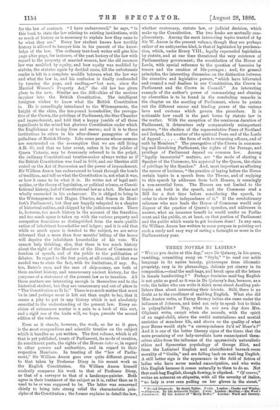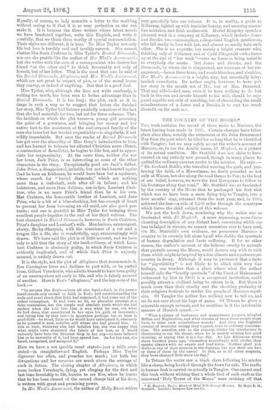THREE NOVELS BY LADIES.* " WOULD you desire at this
day," says De Quincey, in his queer, rambling, scrambling essay on " Style," " to read our noble language in its native beauty, picturesque from idiomatic propriety, racy iu its phraseology, delicate yet sinewy in its composition,—steal the mail-bags, and break open all the letters in female handwriting ? " Perhaps feminine mail-bag English is not quite so good as it was in De Quincey's day, because, as a rule, the ladies who can write it think more about dazzling pub- lishers than about interesting their friends. Still, there is no doubt as to the excellence of mail-bag English. What else did Miss Austen write, or Fanny Burney before she came under the influence of Johnson, and tried not only to speak but to think in polysyllables ? Nay, what in our own day does Mrs. Oliphant write, except when she ascends, with the spirit of an angel-child, above the sordid materialisms and morbid anxieties of mundane life, and shows us the quality of what poor Burns would style "a correspondence fix'd wi' Heav'n P" And it is one of the better literary signs of the times that the more promising of our lady-novelists have emancipated them- selves alike from the influence of the oppressively naturalistic ethics and Spencerian psychology of George Eliot, and from the Latinised English and absinthiated barrack-room morality of " Oujda," and are falling back on mail-bag English. A still better sign is the appearance in the field of fiction of ladies who have never needed emancipation, and who write this English because it comes naturally to them to do so. Not that mail-bag English, though flowing, is slipshod. " Of course," writes an autocrat on etiquette, with all the severity of italics, " no lady is ever seen pulling on her gloves in the street."
• Buried Diamonds. By Sarah Tytler. 3 vols. London Matto and Windrts. —Allegiance. By Ida Ashworth Taylor. 2 vols. London : Bentley.—Her Week's Amusement. By the Author of "Molly Bawn." London : Ward and Downey.
Equally, of course, no lady commits a letter to the mail-bag without seeing to it that it is as near perfection as she can make it. It is because the three writers whose latest novels we have bracketed together, write this English, and write it carefully, that we think them worthy of special commendation. Their styles are different, it is true. To Miss Taylor not only life but love is terribly real and terribly earnest. She cannot chatter like Susie Crabtree in Miss Tytler's Buried Diamonds, nor can she prattle like the author of Her. Week's Amusement ; but she writes with the care of a correspondent who desires her friend "at the other end" to think favourably not only of herself, but of her letter. That is the most that can be said of the Buried Diamonds, Allegiance, and Her Week's Amusement, which are not great in respect of plot, or of the moral lesson they convey, or indeed of anything. But that is a good deal.
Miss Tytler, who, although she does not write carelessly, is writing too much, has been seen to better advantage than in
Buried Diamonds. It is too long ; the plot, such as it is, drags in such a way as to suggest that before she finished her story, Miss Tytler had become painfully conscious of the fact
that she had materials for two, but not for three volumes. Then the incident on which the plot turns—a young girl assuming the guise of a governess, and bringing her money and her native tact to the assistance of the embarrassed family of the man she loves bat has treated coquettishly—is singularly, if not
wildly improbable. But once the reader of Buried Diamonds has got over the absurdity of Miss Gray's introduction to him, and has learned to tolerate her affected Christian name (Benet, a contraction of Benedicta), he begins to like her, and to appre- ciate her magnanimity. At the same time, neither she nor
her lover, Jack Prior, is so interesting as some of the other characters in the story. Exceptionally good are Jack's father, John Prior, a disappointed, irritable, but not bad-hearted sq nire (had he been an Irishman, he would have been but a squireen), whose search for " buried diamonds," which are nothing more than a coal-shaft, ends after all in failure ; and his boisterous, and more than dubious, son-in-law, Lambert Crab- tree, who is no more Prior's friend than he is his own.
Mat Crabtree, the honourable brother of Lambert, and Jane Prior, who is a bit of a blue-stocking, but has enough of heart to prevent her from becoming an old maid, are also good por- traits; and one is grateful to Miss Tytler for bringing these excellent people together in the end of her third volume. The best character in Buried Diamonds, however, is Susie Crabtree, Prior's daughter and Lambert's wife. Mendacious, extravagant, showy, Becky-Sharpish, with the conscience of a cat and a tongue like a file, she is wonderfully, nay, exasperatingly well
drawn. We have said the plot is of little account, and we have only to add that the story of the bank-robbery, of which Lam- bert Crabtree is obviously guilty, in which Susie Crabtree is evidently implicated, and of which Jack Prior is unjustly accused, is unduly drawn out.
It is the style, not the plot of Allegiance that recommends it. Eve Carrington loves and declines to part with, or be parted
from, Gilbert Verschoyle, who admits himself to have been guilty of an unscrupulous act early in life, and who is falsely accused of another. Here is Eve's " allegiance," and the key-note of the book :-
"In natures like Eve's—above all else loyal—faith in the person loved stands only second to faith in God ; and notwithstanding the rude and cruel shock that faith had sustained, it had come out of the ordeal triumphant. It had been no lie, no plausible attempt at a false consolation, but the simple and absolute truth which she had spoken when she told him that it was what he was, not what he bad done, that constituted in her eyes his guilt or innocence ; and trying him by that test—in ignorance perhaps, but at least in good-faith—he stood, little as he would have anticipated it, obscurely as be guessed it now, unfallen still where she had placed him. In this at least, whatever else had befallen her, she was happy that what might have shattered the fabric of her love, as it would certainly have been the bitterest drop in her cup—to have believed him to be unworthy of it, had been spared her. As for the rest, she faced, recognised, and accepted it."
Here we have a not ignoble creed stated—just a trifle over- stated—in straightforward English. Perhaps Miss Taylor digresses too often, and preaches too much ; but both her divagations and her sermons are much above the average of such in fiction. The closing chapter of Allegiance, in which
poor, broken Verschoyle, dying, yet clinging for the first and last time feverishly to life, hurries to see Eve, when he learns that he has been cleared of the second charge laid at his door, is written with great and promising power.
In Her Week's Amusement, the author of Molly Baum, retires very gracefully into one volume. It is, in reality, a guide to Killarney, lighted up with feminine beauty, and amusing mascu- line mistakes, and Irish mother-wit. Muriel Kingsley spends a pleasant week in a company at Killarney, which includes Jones and Brooke, two commonplace, college-bred English gentlemen, who fall madly in love with her, and almost as madly hate each other. She is no coquette, but merely a bright creature who, thinking only of Killarney and of Cyril Fitzgerald—who turns up at the end of " her week "—sees no harm in being amiable to everybody she meets. But Jones and Brooke, and the Desmonds, by whom she is chaperoned, are unaware of her en- gagement,—hence these tears, and comic blunders, and rivalries. Her Week's Amusement is a bright, airy, but essentially fairy- landish comedietta. Its author ought, however, to have put her story in the mouth not of Mr., but of Mrs. Desmond. That any able-bodied man, even if lie have nothing to do but bask in the sun and devote himself to his wife, should be sup- posed capable not only of watching, but of chronicling the small misadventures of a Jones and a Brooke, is to cast too much discredit on the male sex.



































 Previous page
Previous page